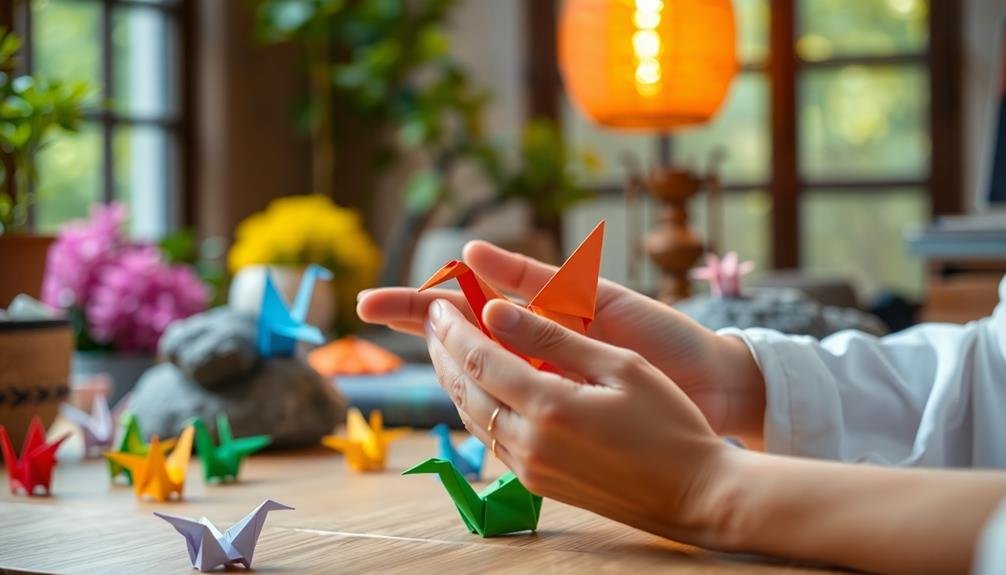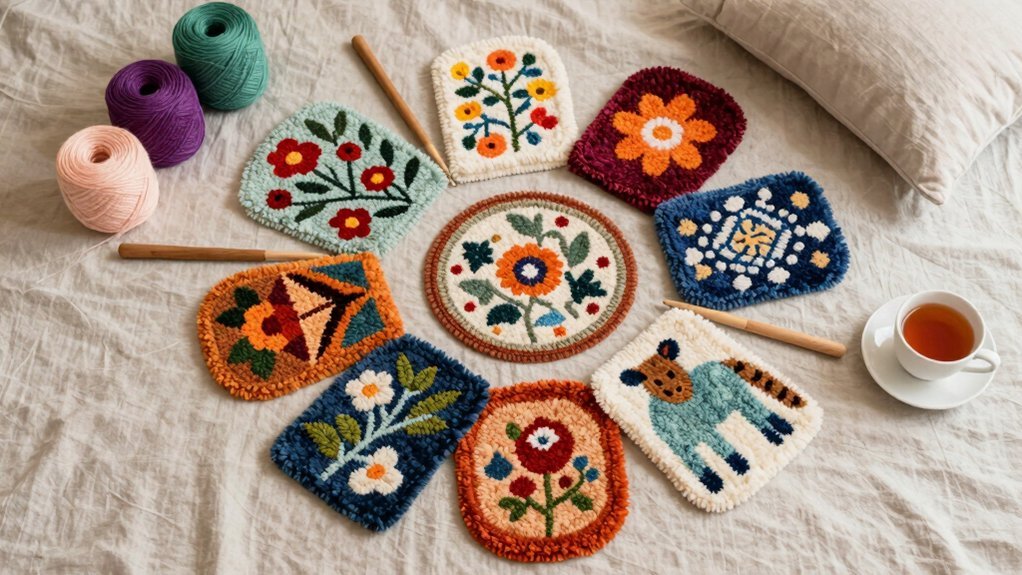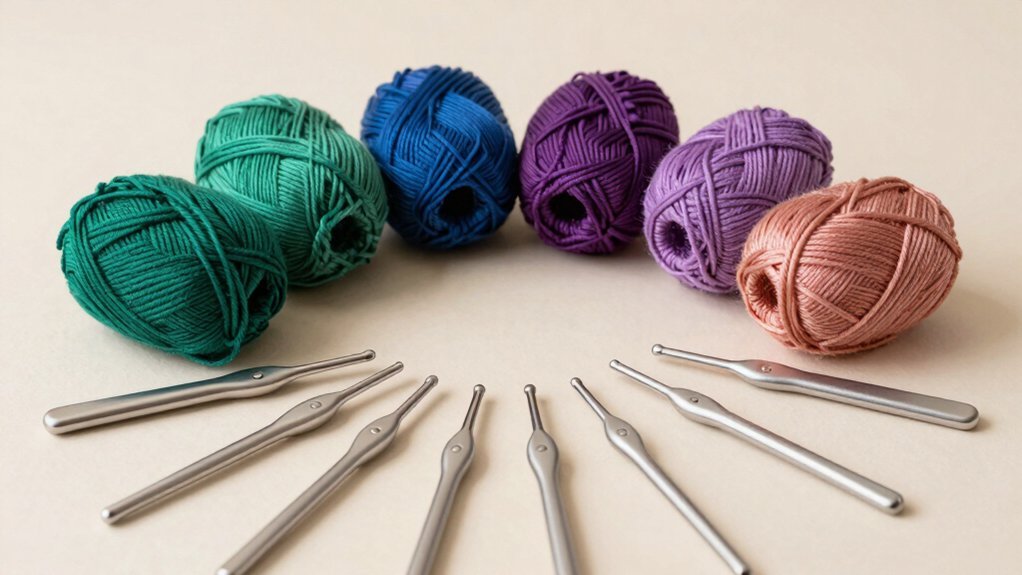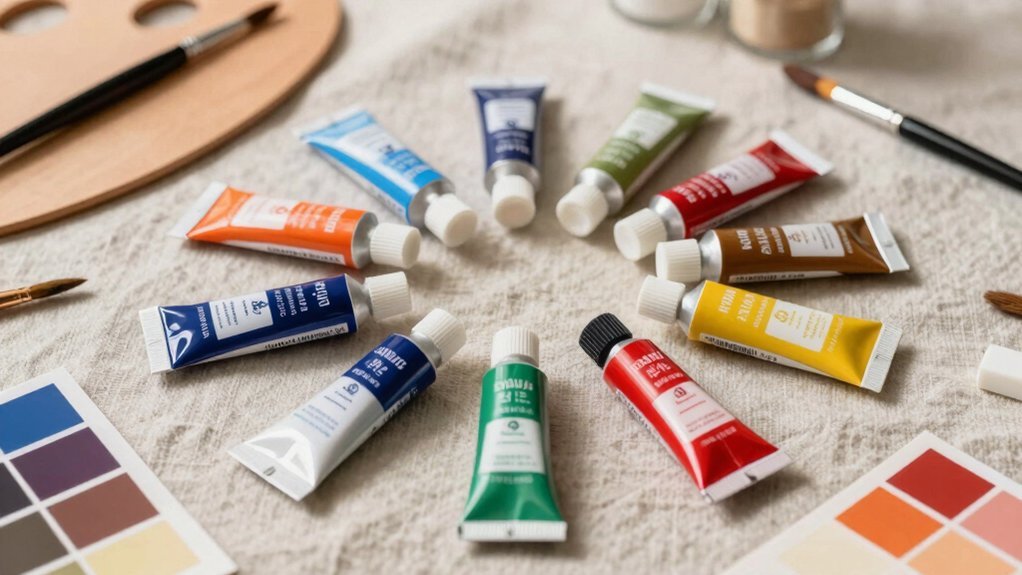Origami offers a powerful way to fold away your stress and worries. As you focus on precise folding techniques, your mind enters a state of calm concentration. The repetitive motions create a soothing rhythm, quieting racing thoughts and reducing anxiety. You'll find yourself fully present in the moment, anchored by the gentle rustle of paper and the tactile experience of folding. This mindful practice not only distracts you from daily stressors but also boosts your confidence as you create beautiful objects from simple materials. By transforming ordinary paper into extraordinary art, you'll discover a unique form of moving meditation that blends creativity and mindfulness. Uncover how this ancient art can reshape your mental landscape.
The Mindful Art of Paper Folding

Many people overlook the meditative qualities of origami, but this ancient Japanese art form offers a unique pathway to mindfulness. As you engage in the precise folding of paper, you'll find your mind naturally shifting into a state of focused calm. The repetitive motions and attention to detail required in origami can help quiet racing thoughts and reduce anxiety.
When you're folding, you're fully present in the moment, concentrating on each crease and fold. This mindful practice encourages you to let go of worries about the past or future, anchoring you in the now. You'll notice your breathing slowing down and your muscles relaxing as you immerse yourself in the task at hand.
Origami also cultivates patience and perseverance. As you work through complex designs, you'll learn to embrace the process rather than fixating on the end result. This shift in perspective can be remarkably freeing, helping you approach other areas of life with a more balanced outlook.
Origami's Calming Effects on Anxiety
When you engage in origami, you're practicing mindfulness through the art of paper folding.
This focused attention on the task at hand can greatly reduce your anxiety levels, drawing your mind away from worries.
As you create tangible results with each fold, you'll boost your confidence and gain a sense of accomplishment, further alleviating stress.
Mindfulness Through Paper Folding
Numerous studies have shown that origami can be a powerful tool for promoting mindfulness and reducing anxiety. When you engage in paper folding, you're forced to focus on the present moment, pushing aside worries about the past or future.
This meditative state allows you to:
- Quiet your mind and slow racing thoughts
- Increase awareness of your breath and body
- Cultivate patience and self-compassion
- Develop a sense of flow and inner peace
As you fold each crease and transform a flat sheet into a three-dimensional object, you're practicing mindfulness in its purest form. You're fully immersed in the task at hand, paying attention to every detail and movement.
This concentration helps break the cycle of rumination and negative thinking that often fuels anxiety.
Moreover, the tactile nature of origami engages your senses, grounding you in the present. The feel of paper between your fingers, the sound of creases being formed, and the visual transformation of the model all contribute to a rich, mindful experience.
Focused Attention Reduces Anxiety
The gentle rustle of paper can be a powerful antidote to anxiety. As you fold and crease, your mind becomes absorbed in the task at hand, leaving little room for worrying thoughts. This focused attention is a key element in origami's ability to reduce anxiety.
When you're engrossed in creating intricate paper shapes, your brain shifts its focus from stressors to the present moment. You're forced to concentrate on each precise fold, which naturally pushes anxious thoughts to the background. This redirection of mental energy can provide a much-needed break from the cycle of worry.
The repetitive nature of origami movements also contributes to its calming effects. As you develop a rhythm in your folding, it can induce a state similar to meditation. Your breathing may naturally slow down, and your muscles might relax without you even realizing it.
Moreover, the sense of accomplishment you feel upon completing an origami project can boost your confidence and provide a positive distraction from anxiety-inducing situations.
You've created something tangible, proving to yourself that you're capable of focusing and achieving goals.
Tangible Results Boost Confidence
Creating origami masterpieces provides a unique sense of accomplishment that can greatly boost your confidence. As you fold each crease and watch your paper transform, you're actively shaping something tangible with your own hands. This process of creation, from start to finish, offers immediate visual feedback of your progress and skill.
The confidence-boosting effects of origami stem from several factors:
- You're learning and mastering a new skill
- You're creating something beautiful from a simple sheet of paper
- You can see your improvement over time
- You have a physical representation of your effort and creativity
When you complete an origami project, you've got a concrete result to show for your time and focus. This tangible outcome serves as a reminder of your capabilities and can help counteract negative self-talk or doubts.
As you build your collection of origami creations, you're also building a visual representation of your growth and perseverance. This constant reinforcement of your abilities can spill over into other areas of your life, fostering a more confident outlook overall.
Simple Origami Projects for Beginners

While diving into origami may seem intimidating, beginners can start with several easy projects that require minimal folds and simple techniques. You'll find these projects both manageable and satisfying as you build your skills.
Start with a classic paper airplane. It's a great way to practice basic folds and experience the joy of watching your creation take flight.
Next, try a simple origami boat. This project introduces you to more precise folding techniques while creating a functional object you can float in water.
For a decorative piece, attempt an origami crane. Though slightly more complex, it's achievable for beginners and teaches you essential folds used in many other designs.
If you're looking for a practical item, fold an origami box. It's perfect for storing small objects and helps you understand three-dimensional folding concepts.
Don't forget the iconic origami heart. It's a sweet, simple project that you can give as a gift or use as a bookmark.
As you practice these beginner-friendly designs, you'll gain confidence and develop the skills needed to tackle more intricate origami projects in the future.
Focusing the Mind Through Folding
As you become more comfortable with basic origami techniques, you'll start to notice how the act of folding can calm your mind. The repetitive motions and focus required for origami create a meditative state, allowing you to temporarily forget your worries and immerse yourself in the present moment.
When you engage in origami, your mind naturally shifts its attention to:
- The texture of the paper between your fingers
- The precise angles and creases you're creating
- The gradual transformation of a flat sheet into a three-dimensional object
- The satisfaction of completing each step in the process
This intense concentration on the task at hand leaves little room for anxious thoughts or distractions.
You'll find that your breathing naturally slows and your muscles relax as you fold. The more complex the design, the more your mind must engage, further enhancing the stress-relieving benefits.
Origami as a Meditative Practice

Rooted in ancient Japanese traditions, origami offers more than just artistic expression—it's a powerful tool for mindfulness and meditation. As you fold paper into intricate shapes, you'll find yourself naturally entering a meditative state. The repetitive motions and focus required for each crease create a rhythm that calms your mind and slows your breathing.
You'll notice that as you concentrate on the folds, your thoughts about daily stressors begin to fade away. This single-pointed attention is similar to traditional meditation practices, allowing you to stay present in the moment. The tactile experience of handling paper engages your senses, grounding you in the here and now.
Origami also encourages patience and acceptance. You'll learn to embrace imperfections in your creations, mirroring the practice of self-compassion in meditation. As you progress, you'll develop a deeper appreciation for the process rather than fixating on the end result.
This shift in perspective can spill over into other areas of your life, helping you approach challenges with a calmer, more centered mindset. By incorporating origami into your routine, you're cultivating a unique form of moving meditation that combines creativity with mindfulness.
Creating Beauty From Everyday Materials
Origami's paper-folding magic transforms ordinary materials into extraordinary art. You'll be amazed at how a simple sheet of paper can become a delicate crane, a fierce dragon, or an intricate flower. This art form doesn't require expensive supplies or specialized equipment. Instead, it celebrates the beauty found in everyday items.
As you fold, you'll discover the hidden potential in common materials:
- Paper napkins become elegant swans
- Old newspapers turn into sturdy boxes
- Colorful wrappers morph into miniature stars
- Even dollar bills can be folded into tiny shirts
You'll develop a new appreciation for the world around you, seeing possibilities where others see waste. Origami teaches you to look beyond the surface and find beauty in unexpected places. It's a reminder that with creativity and patience, you can create something magnificent from the most humble beginnings.
This transformation process isn't just about the final product. It's about the journey of discovery, the satisfaction of creating, and the joy of bringing beauty into the world.
As you fold, you're not just manipulating paper; you're crafting a new perspective on life's simple pleasures.
Frequently Asked Questions
Can Origami Help With Specific Mental Health Conditions Like Depression or PTSD?
Origami can be beneficial for depression and PTSD. You'll find it helps reduce stress, improves focus, and boosts self-esteem. It's a mindful practice that can calm your thoughts and provide a sense of accomplishment, aiding mental health recovery.
Are There Any Potential Negative Effects of Practicing Origami Regularly?
You're unlikely to experience negative effects from regular origami practice. However, you might develop paper cuts, eye strain from prolonged focus, or frustration if you're overly perfectionist. It's important to take breaks and practice moderation.
How Does Origami Compare to Other Stress-Relief Activities Like Coloring or Knitting?
You'll find origami offers unique benefits compared to coloring or knitting. It's more tactile and three-dimensional, engaging your spatial reasoning skills. Unlike coloring, you're creating something functional. It's portable and doesn't require special materials like knitting does.
Can Children Benefit From Origami as a Stress-Reduction Technique?
Yes, children can benefit from origami as a stress-reduction technique. You'll find it helps kids focus, improves their concentration, and boosts patience. It's a fun, hands-on activity that'll calm their minds and promote creativity.
Are There Any Cultural or Spiritual Aspects to Origami Practice?
You'll find origami deeply rooted in Japanese culture and spirituality. It's often used in Shinto rituals and Buddhist practices. You can experience mindfulness and meditation through folding, connecting with traditions that value patience and precision.
In Summary
You've discovered a simple yet powerful way to reduce stress through origami. By focusing on each fold, you're letting go of worries and living in the present moment. Whether you're a beginner or an expert, paper folding offers a meditative escape from daily pressures. Remember, it's not about perfection but the journey. So pick up a sheet of paper, start folding, and watch your anxiety melt away with each crease.





Leave a Reply